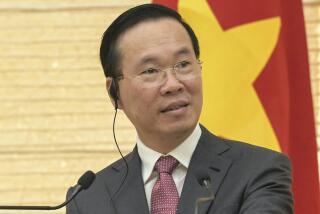ASIA : Deng Death Watch Consumes China’s Rumor-Swept Capital
- Share via
BEIJING — In the last week of January, just before the Chinese New Year, a flurry of rumors and speculation swept this city, lighting up phone lines at embassies and foreign journalists’ offices all over the capital.
How quickly the rumors spread was an example of the edgy mood that exists here these days. Senior leader Deng Xiaoping, 90, is seriously ailing. His daughter has said that Deng can no longer stand on his own and that his health deteriorates “day by day.”
With the same end-of-reign anticipation that marked Chinese history through centuries of dynastic rule, China has begun a death vigil.
One eye is on the failing form of Deng, who pulled this country out of the 10-year Cultural Revolution, China’s own reign of terror, and led it through 16 years of unprecedented economic development.
The other eye cautiously observes the palace intrigues of would-be successors and the movements of old rivals longing for political redemption.
The Deng death watch has revived the old Cold War industry of scrutinizing Chinese political leaders in great detail. No action, statement, appearance or even unexplained absence is too small to note.
*
The scrutiny is not limited to established Communist Party big shots such as President Jiang Zemin, the party’s general secretary and Deng’s handpicked successor, or Premier Li Peng, the leader of the party hard-line faction.
Even the six surviving members of the “Eight Immortals”--a cadre of Communist Party revolutionaries now in their late 80s or early 90s--are being watched. Hong Kong Chinese newspapers, for example, reported extensively on a long interview given recently by Bo Yibo, a longtime Deng ally who is one of the hallowed “Immortals.”
In the November interview, Bo, 86, spoke openly about the looming succession of power and announced his support for Jiang as “the core” of the third generation of Communist leadership.
Another of the “Immortals,” former President Yang Shangkun, caused a stir in the Hong Kong press in a mid-January visit to the southern economic zone of Shenzhen, across the border from Hong Kong. Yang, 87, is said to be the fittest of the remaining octogenarian founding fathers of the Communist regime. His strong military connections make him a force to be reckoned with in a post-Deng China.
Age and title mean little here. After his official “retirement” in 1989, Deng kept only honorary titles as chairman of a charity group and “most honorary chairman” of the Chinese Bridge Assn. In recent years, he has even given up these titles.
*
Yet in keeping with the Chinese dynastic tradition, he will remain the most powerful figure in China until his death. Until that day, the succession battle is played out as a political shadow puppet theater.
The focus of the most recent round of speculation, the one that had phones engaged in embassy political sections all over Beijing, was Qiao Shi. Qiao, 70, chairman of the National People’s Congress and a dark-horse candidate to replace Deng when he dies, had turned up missing.
The former state security chief had not been seen in public or appeared on television in more than a week when the rumors began.
China watchers, antennae quivering with excitement, noted that Qiao was the only one of China’s top leaders absent from a key Jan. 15 meeting. They also reported that Qiao failed to attend a Jan. 23 meeting on party discipline that all the other leaders attended.
Had the carefully crafted Communist Party program for succession come unhinged? Was Qiao out? Or was he so in that all the others were out?
The answer, stories in the Chinese official press showed later, was that Qiao had only been out of town, making a weeklong visit to Shanghai, China’s east coast economic center.
But even his reappearance did not end speculation. China watchers noted that the well-dressed leader, his eyes hidden behind thick-rimmed dark glasses, had acted in particularly imperious fashion on his Shanghai visit, almost as though he were already ruler of the world’s most populous country.
More to Read
Sign up for Essential California
The most important California stories and recommendations in your inbox every morning.
You may occasionally receive promotional content from the Los Angeles Times.













